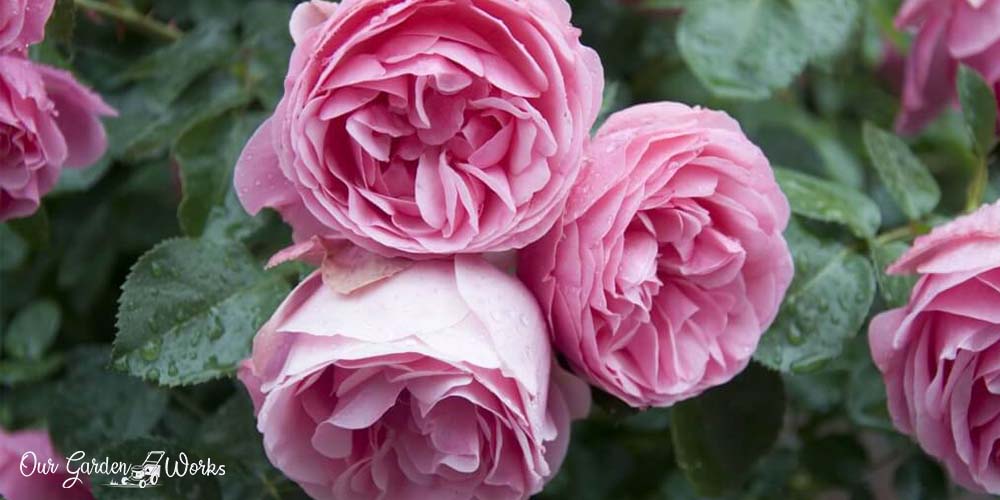Roses are one of the most loved perennial flowering plants that symbolizes love across different cultures. They are easy to grow and love sunny weather.
Some species of roses like knockout roses can be cold hardy and can survive winter with proper care.
However, just like other plants, roses get infested too and even acquire fungal diseases like blackspots.
You’ll find a multitude of insecticides in the market that can help you with your infestation problem. The only catch is it’s hard to find the best ones, especially when overwhelmed with so many choices.
In A Hurry? Our Top Picks:
So, we cut the process for you and listed 10 of the best insecticides for roses made up of different types of organic and synthetic compounds.
Like any other plant treatment, there’s no one-size-fits-all solution but surely there’s one product that will suit your preferences when it comes to gardening.
10 Best Insecticides For Roses – At A Glance
Pictures | Items | Editor's Rating | Check Price |
Bonide Insect Control Systemic Granules | 4.8 | ||
PyGanic Gardening Botanical Insecticide Pyrethrin Concentrate | 4.4 | ||
Sevin Concentrate Bug Killer | 4.4 | ||
Garden Safe Neem Oil Extract | 4.9 | ||
Ortho Bug B Gon | 4.3 | ||
Monterey Horticultural Oil Concentrate | 4.5 | ||
Acephate 97 Up Generic Orthene Insecticide | 4.4 | ||
Rose Rx 3 in 1 Concentrate for Disease and Insect Control | 4.5 | ||
Natural Guard Spinasod Soap | 4.6 | ||
BioAdvanced All-in-One Rose Care | 4.8 |
(You could use the table of contents below to jump to the sections that are most important to you.)
Review of The 10 Best Insecticides For Roses in 2023
Check out the most recommended, and gardener’s favorite insecticides below:
1. Bonide Insect Control Systemic Granules (Imidacloprid Insecticide)
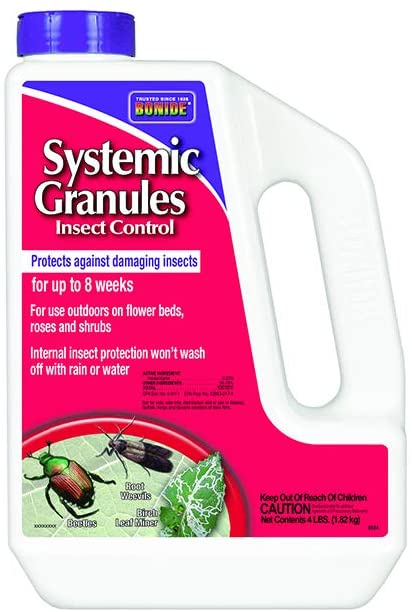
Bonide Insect Control Systemic Granules is a good insecticide for gardeners who are not a fan of spraying. This product helps keep insects away from your roses for up to two weeks.
Its active ingredient is the chemical Imidacloprid that works as a systemic insecticide by damaging the nervous system of insects once they ingest it through the sap or leaves.
It is intended for treating infested shrubs and roses nut not on vegetables or any edible plants. The manufacturer claims that it can help control the following insects:
- Aphids
- Whiteflies
- Mealybugs
- Armored scales
- Adelgids
- Fungus gnat larvae
- Japanese beetles adults
- Lace bugs
- Leaf beetles
- Leafhopper
- Leaf miners
- Pine tip moth larvae
- Plant bugs
- Psyllids
- Sawfly larvae
- Soft scales
- Thrips
- White grub larvae
- Oriental beetle
To apply the insecticide in roses on pots, apply the granules on the top layer of the soil. Mix the granules to 1 to 2 inches of the soil and avoid damaging the upper roots. Then make sure to water it after you apply the fertilizer.
Pro tip: Don’t water your roses too much for the first 10 days to make sure that the roots absorbed the insecticide. The recommended application for roses is ¼ cup and 1 pound of Bonide Insect Control Systemic Insecticide can cover 8 medium-sized roses.
Due to its contents, Bonide Insect Control Systemic Granules Insecticide is highly toxic for aquatic animals. So make sure to not apply it to roses near drainage and water systems, swimming pools, fish ponds, and lakes.
You just have to be careful in using this insecticide since it can cause skin and eye irritation. Since it‘s toxic to marine animals avoid applying the insecticide during the rainy or windy weather to avoid spreading it in the other parts of the garden.
Pros
- Can help control most insects that damage roses
- Specifically made for shrubs and roses
- Doesn’t affect pollinating insects like bees since it’s not a contact insecticide
- You only have t apply insecticide once every two months.
Cons
- Chemical insecticide
- Highly toxic to aquatic animals
- Can’t be used with vegetables and herbs
- Does not treat spider mites and can even make them worse
- May cause skin and eye irritation.
- Poisonous when ingested
- Might kill beneficial insects if you’re not careful in applying the insecticide to your plants
2. PyGanic Gardening Botanical Insecticide Pyrethrin Concentrate
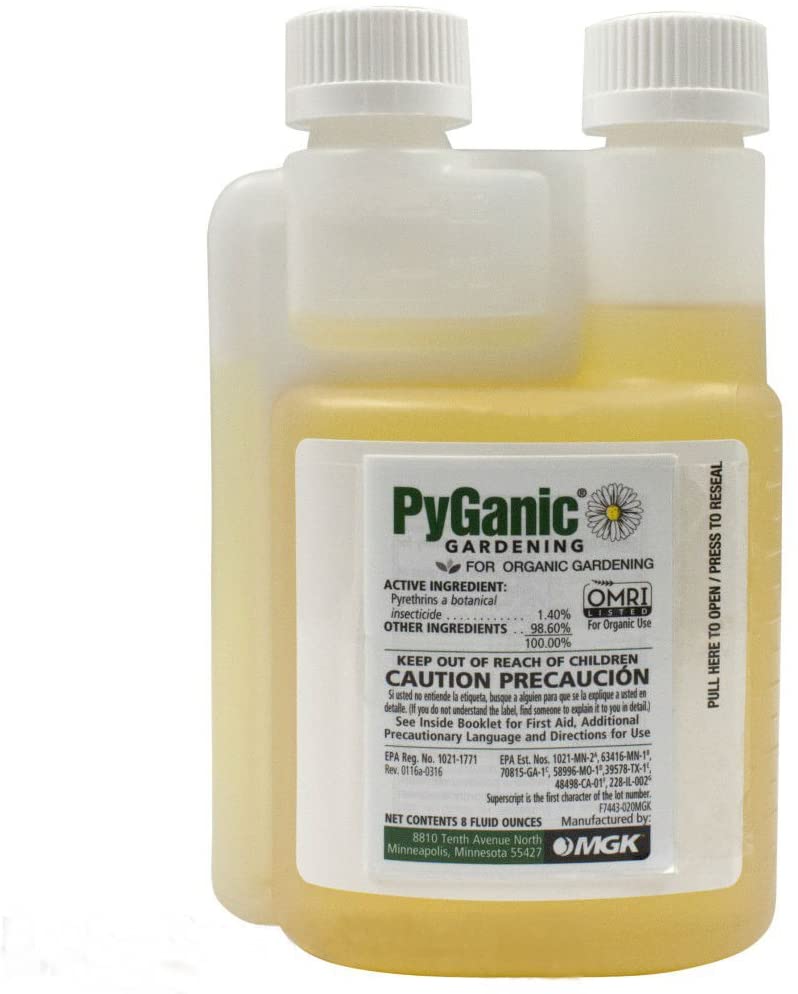
PyGanic Gardening Botanical Insecticide Pyrethrin Concentrate is a contact insecticide made from chrysanthemum flowers that’s perfect for organic gardeners.
Unlike other types of insecticides, pyrethrin can be used in flowering plants, shrubs, and vegetables.
The best thing about this product is its versatility since you can use it not only for roses but also for your other plants. Its active content is 1.4% pyrethrin that can flush out the hiding microscopic insects and mites. The manufacturer claims that it can control over 200 types of pests in your garden including:
- Aphids
- Whiteflies
- Beetles
- Fruit Flies
- Mites
- Japanese Beetles
- Caterpillars
- House Flies
- Boxelder bugs
- Thrips
- Crickets
- Armyworms
- Leafhoppers
- Moths
- Stink Bugs
- Bag Worms
Since PyGanic is a contact insecticide, good coverage is crucial to kill all the pests in your roses. However, it breaks down in direct sunlight and does not have a residual capacity so it’s not suitable as a preventive solution for pests.
While PyGanic can be used on flowering plants like roses, it can be harmful to beneficial insects involved in pollinating your roses. That’s why it’s best to apply it when the good insects are not active like early in the morning or at night.
To apply the fertilizer, you have to dilute 1 to 1.4 fl. oz. for a gallon of water per 1,000 sq. ft. One pint of the concentrate can make up to 16 gallons of diluted insecticide. You have to cover everything with a spray but don’t overdo it to avoid damaging your roses.
Pros
- A botanical insecticide that can be used in flowers, fruits, and other types of plants
- Non-persistent in the environment
- OMRI listed and meets National Organic Program (NOP) requirements
- Good for organic farming
Cons
- Improper application can affect beneficial insects like bees
- It breaks down in sunlight
- It’s not good for indoor and residential misting use
- Might irritate the skin in contact
3. Sevin Concentrate Bug Killer
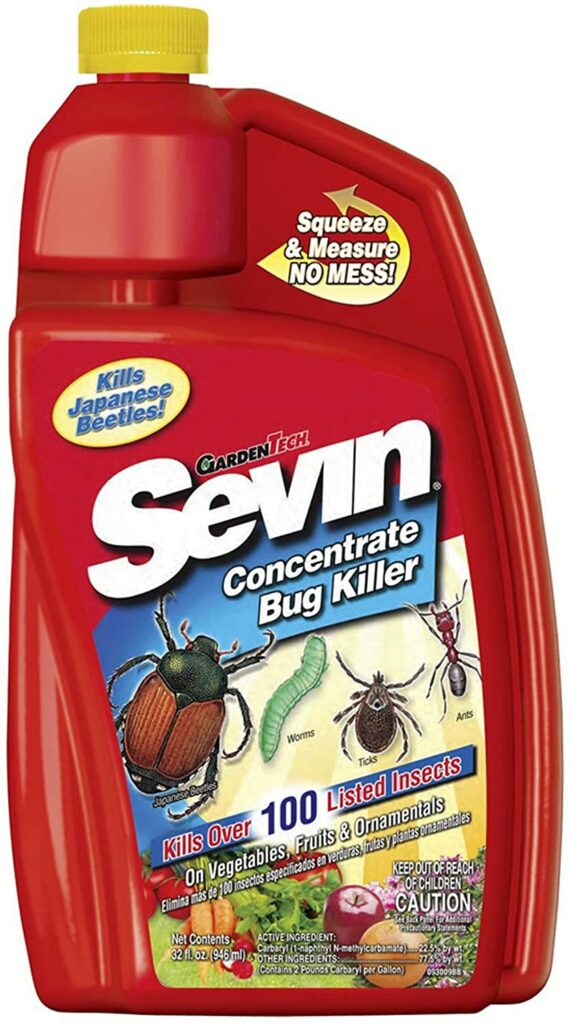
If you’ve been gardening for a while, you will notice that there are two variants with this product. There’s Sevin Dust and Sevin Concentrate. Whichever, you prefer they almost work the same way when it comes to controlling the pests.
Sevin Concentrate Bug Killer is a contact insecticide that can protect your roses for up to 3 months against unwanted pests. It claims that it can kill almost 500 types of insects including Japanese beetles, worms, ticks, ants, and aphids.
Since it’s a concentrated insecticide, a small amount can go a long way. You will only need 4 fluid ounces of Sevin Concentrate for every gallon of water. Its active ingredient is cypermethrin which is a synthetic pyrethroid that acts as a fast-acting neurotoxin to pests.
Cypermethrin is the synthetic version of the botanical insecticide permethrin. Since it’s a man-made chemical, it may cause risks when not properly handled and used. Make sure to not inhale the mist or smell of the product as it can cause acute toxicity to humans and pets.
As a common practice in applying insecticides, you must wear a long-sleeved shirt, long pants, socks, and shoes, and never let the pets come near your roses when the insecticide is not yet dry.
Pros
- Fast-acting insecticide
- Can be used on flowers, fruits, and vegetable plants
- Protects your indoor plants for weeks after the first application
- Controls common insects that affect roses
Cons
- It’s a synthetic/ chemical insecticide
- Might harm pollinating insects if not applied at the right time of the day(night/early morning)
- Highly toxic when inhaled and can cause skin irritation if accidentally applied to the skin. Handling with caution is advised.
4. Garden Safe Neem Oil Extract
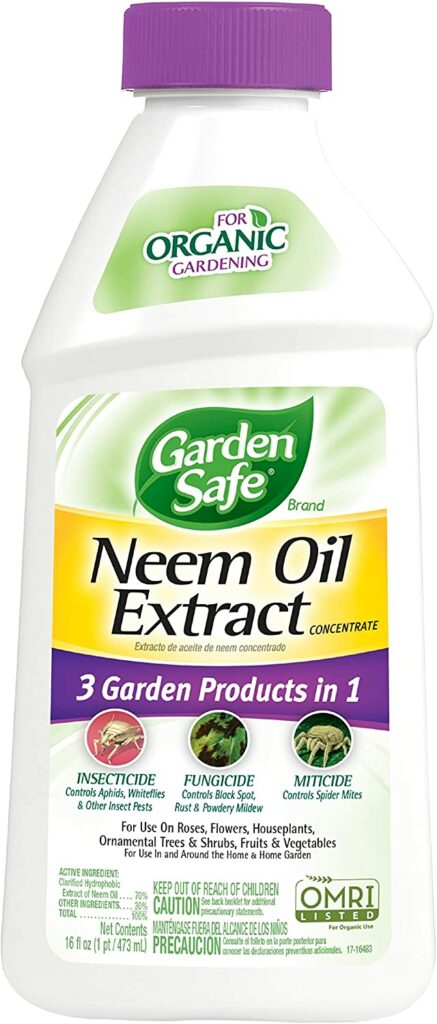
Neem oil is one of the holy grails of organic gardening. It’s been used by farmers and gardeners for many centuries and is dubbed as a naturally-occurring pesticide like pyrethrin from chrysanthemum flowers. It works as an insecticide, fungicide, and miticide in one that’s why it’s almost a gardener’s all-time favorite.
Aside from roses, you may also use this product on flowers, houseplants, ornamental trees and shrubs, fruits, and vegetables. This is usually the most practical product to choose if you also grow a small organic vegetable garden at home.
The manufacturers claim that this product helps keep garden pest control simple and let nature do the rest.
Aside from its three functions Garden Safe Neem Oil Extract also works as a dormant spray that can kill overwintering eggs of unwanted insects under the leaves and the stems of plants.
Garden Safe Neem Oil Extract helps control most of the common garden insects such as:
- Aphids
- Whiteflies
- Spider mites
- Caterpillars
- Adult insects like `Japanese beetles
It can also help control fungus diseases in plants such as:
- Powdery mildew(within 24 hours)
- Black spot on roses
- Anthracnose
- Rust
Before applying this product to your roses, make sure to do a patch test first. Some varieties of roses may be too sensitive for the product and may cause damage without prior testing.
Since it’s an oil-based product, proper timing is required in applying it to your plants to avoid burning them when the sun is out.
Pros
- OMRI (Organic Materials Review Institute) Listed.
- Can be used on roses, fruits, and vegetable plants and safe to apply until the day of harvest
- All-in-one solution: Organic insecticide, fungicide, and miticide
- Safe for humans and pets
Cons
- The insects must consume the neem oil to take effect. If the insects do not ingest this insecticide through the sap or leaves, it will do its work.
- Can burn plants when applied in broad daylight
- It may cause eye and skin irritation and can be toxic when absorbed through the skin
- Toxic to bees
5. Ortho Bug B Gon
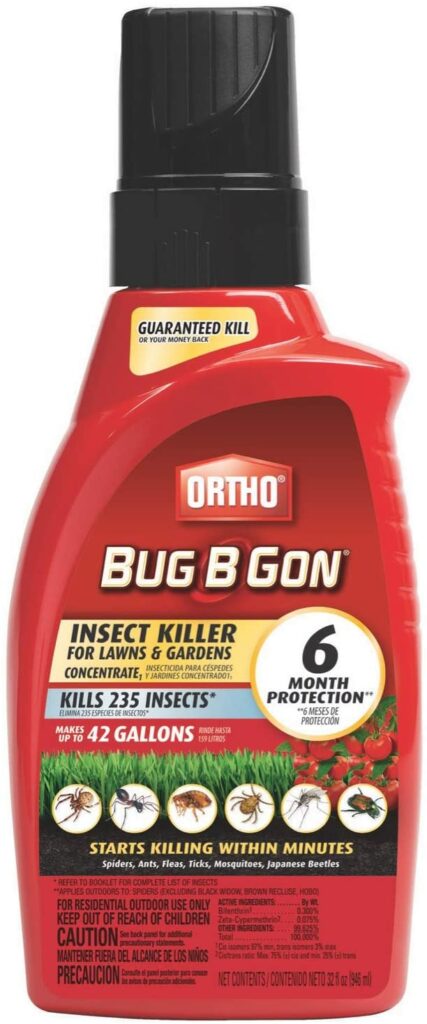
Another systemic insecticide on our list is Ortho’s Bug B Goin Concentrate. It contains 0.5% Acetamiprid which is an organic compound widely used to control insects. Systemic insecticides are absorbed by plants from soil and kill the insects that eat the leaves and sap of your roses.
It helps control common insects in roses such as:
- Aphids
- Whiteflies
- Beetles
- Thrips
- Rose scales
- Rose slugs
The manufacturer claims that it’s a fast-acting and long-lasting formula to control unwanted pests in roses, flowers, fruits, and vegetable plants. The active ingredient Acetamiprid degrades in the soil over time which means its less likely to reach the groundwater and affect the environment.
The material used in Bug B Gon has low toxicity to humans and pets. However, ingestion of this product is highly toxic.
So make sure to keep it out of reach of children and pets. To use this insecticide, you have to dilute 3 tbsps. of the concentrate in 1 gallon of water and spray it on your roses from stems to every side of the leaves.
Pros
- Natural pesticide
- Not toxic to pets and humans but highly toxic to insects
- It degrades in soil and less likely to flow through rivers and groundwater
- Can be applied to roses, fruits, and vegetables
- Can address insects with high resistance such as Bemisia, greenhouse whiteflies, and western flower thrips.
Cons
- Not an all-9in-one solution since it only acts as an insecticide
- Might harm bees in the area if proper application is not practiced
- Highly toxic when ingested by humans and pets
6. Monterey Horticultural Oil
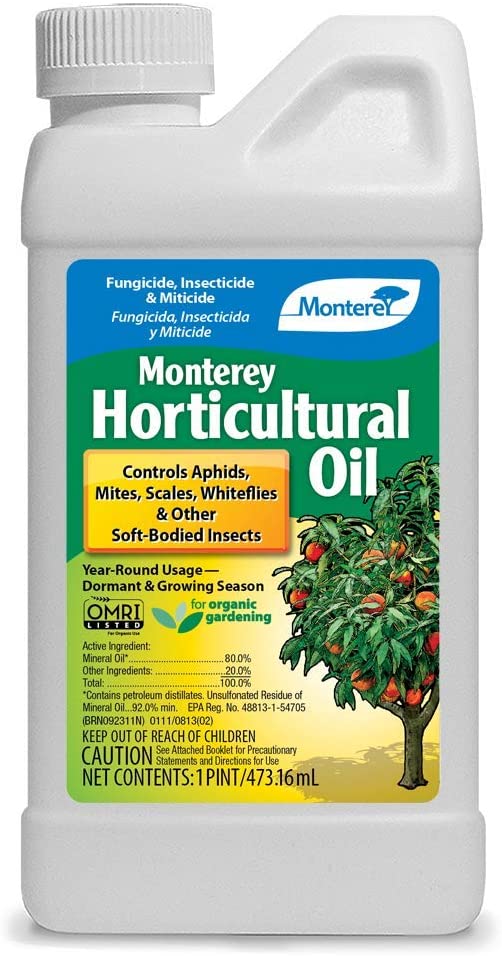
Horticultural oil is another hallmark of organic gardening that’s been used for hundreds of years. It contains petroleum-based oils that are safe for organic gardening. Like most organic insecticides, it can be applied to roses, ornamental plants, fruits, and vegetables.
Monterey’s Horticultural Oil not only helps control insects but also serves as a dormant spray and kills the eggs of insects that overwinter on the leaves or stems of your roses.
Therefore, if you’re looking for a product that you can use throughout the life cycle of your roses, this product can be a good option. It can help control insect infestation in your roses including:
- Aphids
- Fungus Gnat
- Leaf Miners
- Mealy Bugs
- Mites
- Powdery Mildew
- Rust
- Scales
- Thrips
- Whiteflies
You may apply 2.5 to 5 tablespoons of horticultural oil for every gallon of water depending on the severity of infestation on your roses. Since it’s an oil-based insecticide like neem oil, you must apply this product early in the morning or late at night to avoid burning your roses.
You should also wear safety gloves and long sleeves in using this product as it may cause skin irritation through contact with the skin. You should also avoid inhaling the product as petroleum content may induce vomiting and may prose risks of pneumonia.
Pros
- Organic fertilizer
- OMRI listed
- Safe for humans and pets since excess oil evaporates when dried properly
- Can be used during the growing and dormant season
- Can be used on roses, ornamentals, fruits, and vegetables
Cons
- No residual effect
- May burn your plants if applied in direct sunlight
- May cause skin irritation if applied on skin and eyes
7. Acephate 97 Up Generic Orthene Insecticide
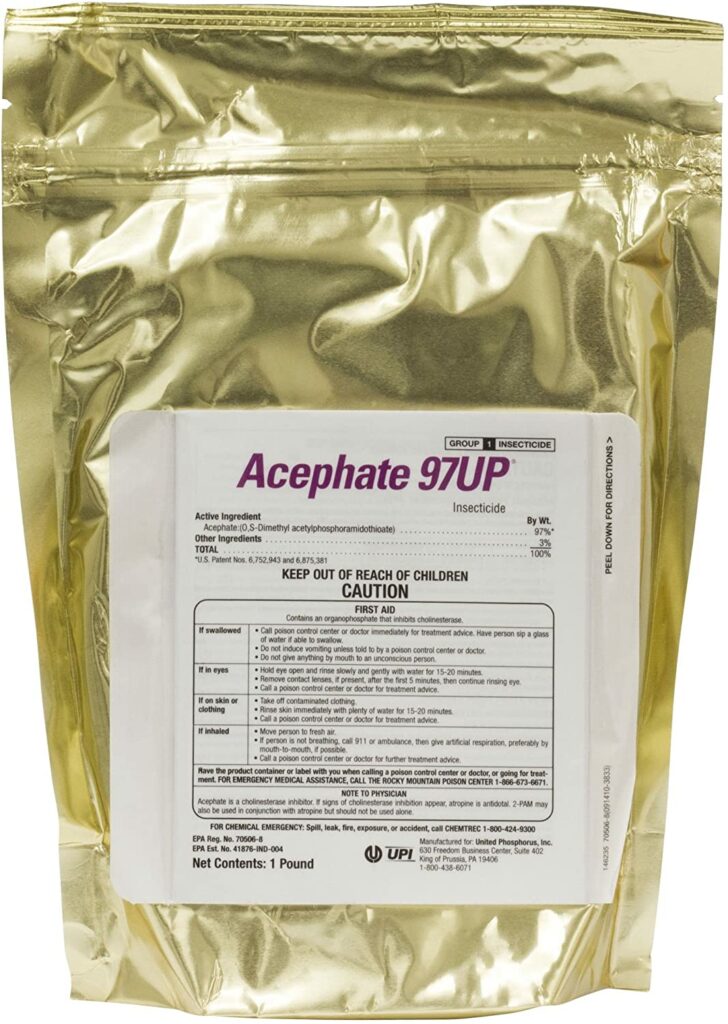
Acephate 97 Up Generic Orthene Insecticide is a water-soluble systemic insecticide. Its active ingredient is 97% acephate with a residual of 10 to 15 days. It is widely used in adequate amounts for controlling pests on crops and ornamental plants.
This insecticide is highly potent and should be handled with care but it works well in controlling unwanted insects.
If there’s a heavy infestation of insects in your area, this would be the best option for you. However, it’s dangerous to use it on plants indoors since the spray mists may contaminate food supplies and utensils and cause health risks.
The manufacturer claims it can kill over 125 types of insects and larvae including:
- Fire ants
- Aphids
- Grasshoppers
- Beetles
- Loopers
- Cutworms
- Thrips
- Whiteflies
- Borers
- Armyworms
- Bollworm
- Tobacco
- Budworm
- Stink bugs
Acephate 97Up is easy to mix on tank sprays and does not bind too much to the soil that makes it not likely to runoff to groundwater and water drainage. You only need 1 teaspoon of this insecticide for every gallon of water. So 1lb of this product can last for a while.
Pros
- Water-soluble granules mixed well inside tank sprays
- Effective in killing insects and even fire ants
- Can kill insects and ats within 24 hours
Cons
- The product has a notorious smell and should be stored in an airtight container or placed outside your home.
- Toxic to bees
- Can’t be used in indoor plants
8. Rose Rx 3 in 1 Concentrate for Disease and Insect Control
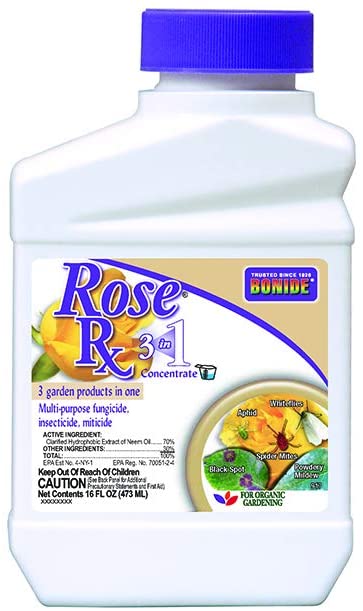
Rose is one of the most cherished flowering plants in the world that there are specific insecticides made for it. One of which is Bonide’s Rose Rx 3 in 1 Concentrate that contains neem oil extract.
Some insecticides can only be applied when the roses already have their first blooms. This product on the other hand can be applied to budding roses to prevent the occurrence of black spots and other fungal diseases. It will be harder to cure your roses once they’re already infected with fungus so apply even if there are no visible signs.
The manufacturer claims that it can help control the notorious pests and diseases that affect roses such as :
- Aphids
- Spider mites
- Whiteflies
- Powdery mildew
- Rose slugs
- Black spot
Though neem oil is considered a natural insecticide, it’s highly toxic to pollinating insects and should not be applied to areas where they’re actively visiting.
Another great thing about this product is it works as an insecticide, fungicide, and miticide, and can help control soil-based pests like spider mites and root aphids.
Pros
- Organic insecticide
- Safe for pets and humans
- Works as an all-in-one solution for pests, fungal diseases, and mites
- Address the specific protection needed by roses
Cons
- Toxic to bees
- May burn your plants if not applied with care
- Can only prevent but not cure fungal diseases once they started damaging your plants
9. Natural Guard Spinasod Soap
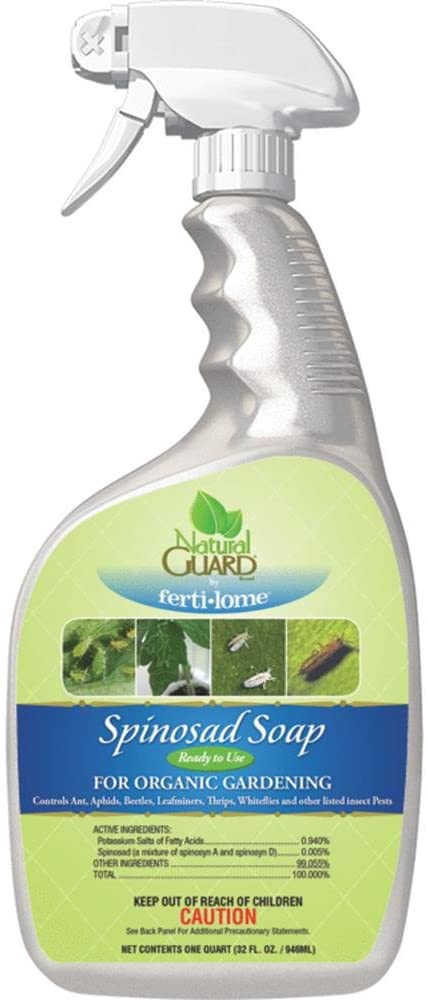
Thrips are among the foliage-eating insects to deal with since they’re too tiny and can hide in every nook they can find.
Natural Guard Spinosad Soap is a good alternative for stronger insecticide formulas in the market. It’s a contact insecticide and must be applied directly to insects to control them.
Natural Guard Spinosad Soap contains 18.8% Potassium Salts of Fatty Acid and 0.1% Spinosad. Spinosad is an insecticide derived from a certain kind of bacteria from the soil. It is especially effective in controlling caterpillars and stubborn thrips for years and was recognized by the USDA National Organic Program as an organic insecticide in 2003.
It may also control other insects including:
- Adelgids
- Aphids
- Armyworms
- Caterpillars
- Leafminers
- Leafhoppers
- Chinch bugs
- Cutworms
- Earwigs
- Mealybugs
- Beetles (Japanese and Colorado Potato beetles)
- Ants
- Borers
- Codling Moth
- Fruit Flies
- Grubs
- Lace Bugs
- Leafrollers
- Loopers
- Moths
- Light Brown Apple
- European Grapevine Moths
- Buck Moth Larvae
- Mites
- Sawfly Larvae
- Scale insects
- Thrips
- Webworms
- Weevils
- Whiteflies
Aside from the insecticidal properties of Natural Guard Spinosad Soap, it also works in controlling powdery mildew.
The only catch is you have to spray the spinosad soap directly on the insects to allow the spinosad to break down the protective coating of the insects.
Pros
- Organic insecticide
- A good alternative for stronger chemical insecticides
- Works as insecticide, miticide, and fungicide
- Can be used in a variety of roses including knockout roses
- Kills insects in contact within minutes
- Can be used in budding roses
Cons
- No residual effect on insects
- Won’t kill insects unless the product comes in contact with them
- May burn your plants, if not applied at the proper time of the day
10. BioAdvanced All-in-One Rose Care
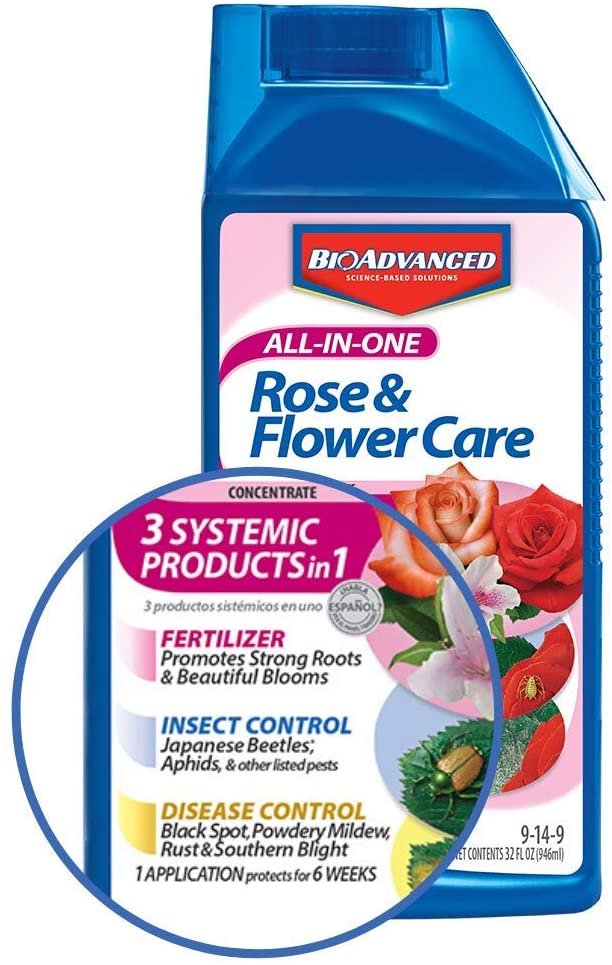
If you’re looking for another all-in-one insecticide formula for roses, BioAdvanced All-in-One Rose Care is, by far, the product that any gardener would look for. It is an insecticide, fungicide, and fertilizer in one.
It’s a 9-14-9 NPK fertilizer that helps boost the growth of strong roots, shoots, and blooms in roses. At the same time, it also contains 0.15% Imidacloprid that is used to control unwanted insects that damage your roses. It also contains 0.80% Tebuconazole which is a fungicide that helps control fungal diseases such as black spots in roses.
While being an all-in-one solution is not enough, it’s a systemic solution that can protect your roses for up to 6 weeks.
Another feature of this product is you don’t have to reapply it after the rain because it’s a rainproof formula. As an all-in-one solution it helps control the following insects and plant diseases:
Insects:
- Japanese beetles
- Aphids
- Leafhoppers
- Adelgids
- Black Vine Weevil Larvae
- Lace Bugs
- Leaf Beetles
- Leafminers
- Mealybugs
- Psyllids
- Scales
- Thrips
- Whiteflies
Fungal diseases:
- Black spot
- Powdery mildew
- Rust
- Southern blight
While it serves a lot of benefits for roses, this product is not applicable for fruit and vegetable plants. It comes in granules and should be applied by mixing it at the top of the soil. The recommended application rate for roses is 4 tablespoons of granules for 1 quart of water for each rose plant.
Since it contains imidacloprid, this product is highly toxic to aquatic animals so you should not use it on roses planted near lakes, pools, and drainage systems. It can also be highly toxic to bees visiting your roses, so make sure to apply the insecticide at the time they’re not active.
Pros
- Works as a fertilizer, insecticide, and fungicide for roses
- A systemic rainproof solution
- Easy to apply on roses
Cons
- Restricted for sale in NY, CT, MD, VT
- Toxic to bees and aquatic animals if not handled properly
- Chemical insecticide
- Tebuconazole content is considered by WHO as slightly hazardous
Tips For Choosing The Best Insecticide For Your Roses
There are different types of gardeners and we all have our preferred ways of taking care of our roses.
Regardless of the differences, here are some of our recommendations to make the decision making easier and selection worth the price for you:
- Identify what types of insects or fungal diseases are damaging your roses to choose the best solution for the infestation. Certain types of insecticides are good at controlling specific pests. One example would be Bt or Bacillus Thuringiensis is an insecticide that targets the larvae type of pests.
- The right insecticide for you will depend on your gardening lifestyle and priorities. Some insecticides can protect your roses for weeks and even months but they’re most likely made up of chemical variants.
On the other hand, you may also opt for organic insecticides, but some variants are contact insecticides and can be washed off by rain. That’s why you have to know what’s the quality you’re looking for in an insecticide before purchasing one since it will be based on what’s convenient and safe for you. - Check for the safest insecticide for your setup. Some insecticides are not applicable for indoor roses since the chemicals used are too toxic and may contaminate your indoor fixtures.
- Some types of insecticides are also not applicable for plants near water drainages, pools, fish ponds, and lakes since they are highly toxic to aquatic animals.
- Lastly, you may use two products to control your target pests while avoiding potential risks in using stronger types of insecticides. You may find that most gardeners use this technique just to keep their environment and pets safe from any health risks and pollution.
- Always follow the recommended application rates so to avoid burning your roses, and posing risks to the environment especially with synthetic fertilizers.
- Lastly, before trying any insecticide, try physical control measures first like wiping the leaves with soapy water. If that solves the problem then there’s no need to buy an insecticide. However, if you’re still suspecting that some insects may bring fungal disease or threaten the life of your roses, then for peace of mind’s sake, it’s always good to keep an insecticide handy in your home.
Final Thoughts
Organic or not, it’s much better to not use insecticides for your roses to keep the ecosystem of pollinating insects free from risks.
However, some pests are persistent and will suck all the life from your roses if you won’t do something to control them.
We hope that this post gave you some insights into the 10 best insecticides for roses we featured.
If you find this post helpful, share it with your gardening squad and brainstorm together on which one should you choose for your roses.
Let us know in the comments about your experience with the best insecticides for roses that you chose. We hope you ended up with bigger and beautiful blooms by using it!
